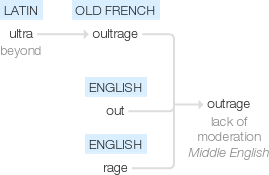Outrage
Middle English (in the senses ‘lack of moderation’ and ‘violent behaviour’): from Old French ou(l)trage, based on Latin ultra ‘beyond’. Sense development has been affected by the belief that the word is a compound of out and rage.
wiktionary
From Middle English outrage, from Old French outrage, oultrage(“excess”), from Late Latin *ultrāgium, *ultrāticum ("a going beyond"), derived from Latin ultrā(“beyond”). Later reanalysed as out- + rage, whence the contemporary pronunciation, though neither of these is etymologically related.
The verb is from Middle English outragen, from Old French oultragier.
etymonline
outrage (n.)
c. 1300, "evil deed, offense, crime; affront, indignity, act not within established or reasonable limits," of food, drink, dress, speech, etc., from Old French outrage "harm, damage; insult; criminal behavior; presumption, insolence, overweening" (12c.), earlier oltrage (11c.), from Vulgar Latin *ultraticum "excess," from Latin ultra "beyond" (from suffixed form of PIE root *al- "beyond").
Etymologically, "the passing beyond reasonable bounds" in any sense; meaning narrowed in English toward violent excesses because of folk etymology from out + rage. Of injuries to feelings, principles, etc., from 1769.
outrage (v.)
c. 1300, outragen, "to go to excess, act immoderately," from outrage (n.) or from Old French oultrager. From 1580s with meaning "do violence to, attack, maltreat." Related: Outraged; outraging.
